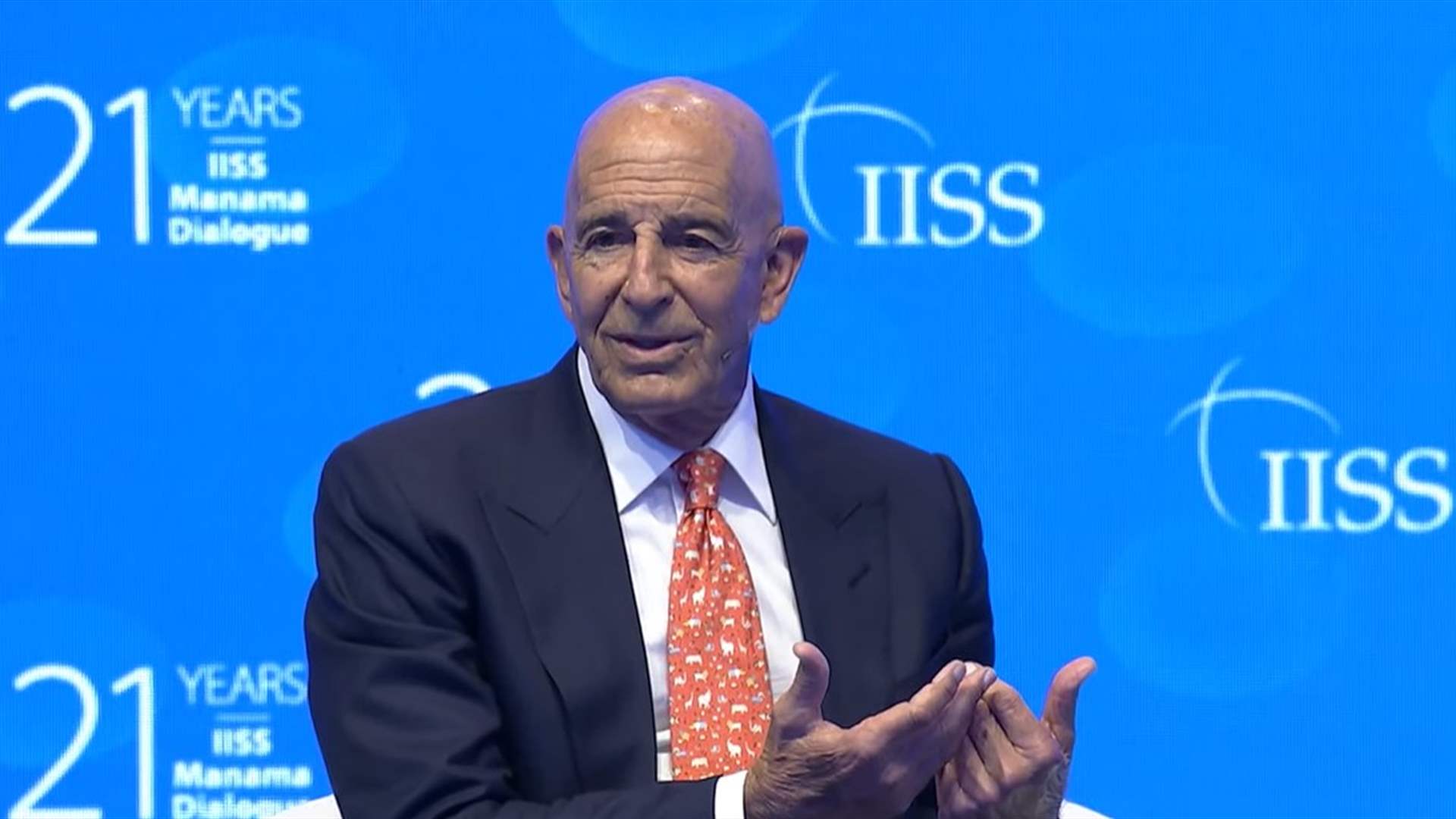U.S. Envoy Labels Lebanon a “Failed State” Amid Economic and Infrastructure Collapse
He highlighted Lebanon’s underfunded public services and the imbalance between the under-equipped army and Hezbollah’s powerful, well-funded militia.

ERBIL (Kurdistan24) — The United States envoy for Syria, Tom Barrack, highlighted Lebanon’s institutional and economic collapse during the Manama Dialogue in Bahrain on Saturday, raising renewed questions about the effectiveness of the country’s Christian leadership, led by President Joseph Aoun, and its alignment with U.S. strategic goals in the region.
Barrack described Lebanon as a “failed state,” noting the absence of a functioning central bank, a collapsed electricity sector, and a population forced to rely on humanitarian aid.
He emphasized that key public services, including water and education, remain inadequately provided, while the Lebanese Armed Forces are undermined by Hezbollah’s 40,000-strong militia, which receives significantly higher monthly pay than state troops and possesses thousands of rockets and missiles capable of threatening Israel. In comparison, Lebanese army soldiers are underpaid and under-equipped.
Barrack emphasized that any meaningful diplomatic progress regarding Lebanon must involve direct talks with Israel. Speaking at the IISS Manama Dialogue in Bahrain, Barrack said, “The conversation needs to be with Israel. It just needs to be with Israel. Israel is ready.”
While acknowledging that Lebanese leaders are “rightly hesitant” given the region’s dangerous environment, he stressed that Washington is prepared to support such negotiations and apply pressure on Israel to act reasonably.
Barrack highlighted that the path forward requires dialogue in Jerusalem or Tel Aviv, coordinated with Syria, which he said is “showing the way.”
Observers note that under President Joseph Aoun, Lebanon’s leadership has largely continued the pattern established by previous Iran-backed governments, focusing primarily on confronting Israel rather than addressing broader strategic priorities advocated by Washington.
Despite repeated U.S. calls to disarm Hezbollah, reduce Iranian influence, and restore state sovereignty, Aoun has emphasized negotiations with Israel and condemned its military actions, while Hezbollah retains significant autonomy and military capability in southern Lebanon.
Recent Israeli air strikes, including the killing of a Hezbollah operative and a municipal worker, highlight the ongoing security tension in the south, yet the Lebanese government has not taken decisive steps to implement a credible and transparent disarmament process of Hezbollah — an action the US repeatedly requested and publicly pressured for.
U.S. and other Western officials stressed that limiting Hezbollah’s power is a prerequisite for stability and for preventing further conflict with Israel; meanwhile, what actually happens on the ground underscores a growing gap between Washington’s strategic objectives and the priorities of Lebanon’s current administration.
Despite Lebanon being led by a Christian presidency and fully supported by Washington, the country continues to face challenges in limiting Iranian influence, curbing Hezbollah’s military capabilities, and fully restoring state sovereignty—core objectives of U.S. policy in Beirut.
Economically, the nation remains mired in crisis, with previous reform promises largely unfulfilled. These dynamics have fueled debate in Washington over whether the U.S. should reconsider its support for Lebanon’s new leadership or explore alternative leadership capable of genuinely reforming the country, safeguarding sovereignty, and aligning Beirut with U.S. strategic interests.
Barrack also updated on U.S.-backed diplomatic efforts in Syria, confirming that Damascus’s interim President Ahmed al-Sharaa is expected to travel to Washington this month to formalize Syria’s participation in the U.S.-led Global Coalition to Defeat ISIS, signaling continued American engagement in regional security affairs.
The trip would mark Syrian interim President Ahmed al-Sharaa’s first visit to Washington and his second to the United States, following a historic September visit to the UN in New York, where he became the first Syrian leader in decades to address the General Assembly.
Previously linked to Al-Qaeda through his group Hayat Tahrir al-Sham (HTS), Sharaa’s organization was removed from Washington’s terrorist list as recently as July.
In May, Sharaa met U.S. President Donald Trump in Riyadh for the first time, in a visit described as historic, which culminated in Trump pledging to lift economic sanctions on Syria.
Lebanon’s current trajectory reflects the broader challenge facing Washington: whether to continue investing in a leadership that has failed to deliver meaningful reforms or to push for a new approach capable of stabilizing the country, curbing Iranian-backed militias, and restoring both economic and political functionality.
Observers argue that without decisive change, Lebanon’s Christian leadership risks undermining U.S. strategy, leaving Hezbollah unchallenged and the population increasingly dependent on external assistance.